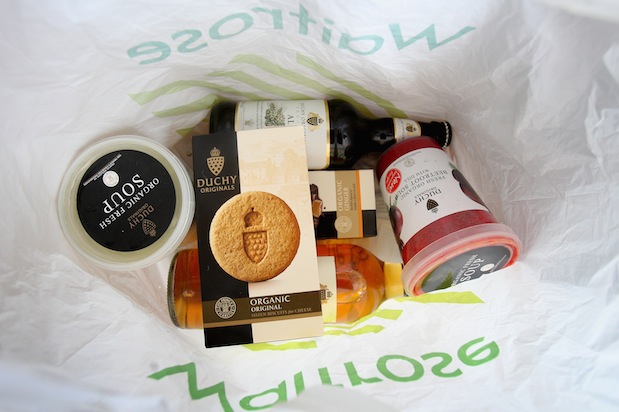Waitrose in Towcester has closed down for a week to make what it describes as ‘a final few touches’ to an ‘exciting’ refurbishment. We will see just how exciting this is when the store reopens this weekend with its ‘improved customer toilets’, ‘improved café’, and so on. But forgive me for being a little sceptical, for normally the main effect of a supermarket ‘refurbishment’ is to disorient shoppers. Managements wait until customers such as myself have finally mastered the layout of the store and know where to find everything they need (something that can take a long time to achieve) and then suddenly they move everything around again.
It is difficult to understand why they should wish to test their customers’ patience in this way, but perhaps it’s because work in a supermarket would be unbearably boring without such periodic upheavals. I can’t imagine it’s much fun stacking products on the same shelves day after day, year after year; and the staff of Waitrose in Towcester (or ‘partners’, as they are called) seemed unusually lively and stimulated during the weeks of growing disruption prior to the closure.
Some customers, on the other hand, have been looking puzzled and uneasy. There had been no evidence that people were dissatisfied with the previous arrangements. No one, as far as I know, had complained about the toilets or the café. I, for one, thought they were both fine. And I took a certain pride in being able to find my way quickly to a vanilla pod, say, or to a jar of sauerkraut, without having to consult a ‘partner’ as to its whereabouts. But now I will have to start learning my way around Waitrose all over again, like a London taxi driver learning ‘the knowledge’, and very dispiriting this is likely to be. But then, I suppose, it is just possible that I may find the new Waitrose as exciting as the management predicts.
One consequence of becoming old and forgetful is that I now often go to Waitrose without any carrier bags and have to ask for plastic bags, which they give away most generously. Not for long, however, for by next year there won’t be anywhere in the United Kingdom where plastic bags will be free. Already in Wales and Northern Ireland shops are obliged to charge 5p for a plastic bag, and by 2015 the same will be true of Scotland and England as well. I have to admit that I rather like the plastic bag — it is remarkably light and capacious — but hostility to it has grown so much in recent years that it appears now to be heading for extinction not only here but throughout the world too.
The European Union is shortly expected to legislate to oblige every member state to take steps, either by imposing a levy on plastic bags or by banning them altogether, that would halve plastic bag handouts over three years and then reduce their use by 80 per cent by the end of this decade. At the moment, the average EU citizen uses an impressive 198 plastic bags a year. Already in the United States plastic bags have been outlawed in many cities, but now California seems set to become the first state to ban them altogether. The state senate is considering legislation that would replace them with free, biodegradable paper bags or with more robust, reusable plastic bags that would cost ten cents each.
The case against plastic bags is a strong one. They mostly get used only once but can last thereafter for up to a millennium. They blow about in the wind, get caught in trees, block drainpipes and generally disfigure the landscape, while at the same time they wash out to sea, litter beaches, and cause enormous damage to marine life, contaminating vast numbers of fish and seabirds. In America, the campaign against plastic bags has been going on for decades, but until now the plastics industry has thwarted all attempts to introduce statewide bans. Finally, however, the environmentalists seem to be winning, despite the industry’s efforts to exploit popular resentment at being asked to pay for packaging that has always been free. I think I may resent that, too; and I may also find the new Waitrose too exciting. So perhaps the time has come for me to stay at home and do all my shopping on the internet.
Got something to add? Join the discussion and comment below.
Get 10 issues for just $10
Subscribe to The Spectator Australia today for the next 10 magazine issues, plus full online access, for just $10.
You might disagree with half of it, but you’ll enjoy reading all of it. Try your first month for free, then just $2 a week for the remainder of your first year.













Comments
Don't miss out
Join the conversation with other Spectator Australia readers. Subscribe to leave a comment.
SUBSCRIBEAlready a subscriber? Log in